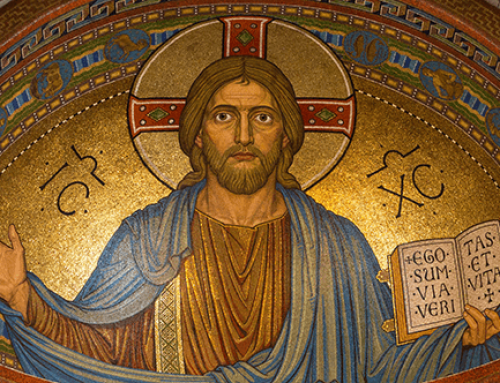 One of my favorite stories in the Old Testament takes place in Exodus when Moses has been leading God’s people through the wilderness. While Moses is away on Mount Sinai, the people rebel against God and compel Aaron to create for them an idol to worship – like they had when they were slaves in Egypt.
One of my favorite stories in the Old Testament takes place in Exodus when Moses has been leading God’s people through the wilderness. While Moses is away on Mount Sinai, the people rebel against God and compel Aaron to create for them an idol to worship – like they had when they were slaves in Egypt.
After Moses comes down from the mountain and deals with the rebellion, Moses and God have a conversation. God expresses His frustration with the people to Moses, and Moses pleads with the Lord to forgive them. As they converse, the discussion becomes personal for Moses:
“Now therefore, I pray You, if I have found favor in Your sight, let me know Your ways that I may know You, so that I may find favor in Your sight.” (Exodus 33:13)
Moses is hungry for more of God. His desire is to know and understand God more fully, that he might live his life in the sweet spot of God’s favor. After another short exchange, Moses blurts out the deep longing of his heart, saying, “I pray You, show me Your glory!” (Exodus 33:18).
God replies,
“I Myself will make all My goodness pass before you, and will proclaim the name of the LORD before you; and I will be gracious to whom I will be gracious, and will show compassion on whom I will show compassion.” But He said, “You cannot see My face, for no man can see Me and live!” (Exodus 33: 19-20)
God’s Glory in His Goodness
When Moses asked for a glimpse of the glory of God, the LORD immediately replied, “I Myself will make all My goodness pass before you.” I find it revealing that God’s first thought was of His goodness. When we think of the glory of God, it is more likely our thoughts would turn to something big and flashy, like God’s almighty power; His eternal, unchanging nature; His sovereignty; His holiness; His infinite knowledge and understanding; or even, His love. But when it comes to His glory, God directed Moses’ attention to His goodness. That alone speaks volumes of God’s character.
But there is more.
God instructs Moses to meet Him on the mountain and to stand in a certain spot where there is a cleft in the rock. The LORD explains to Moses, “…while My glory is passing by, I will put you in the cleft of the rock and cover you with My hand until I have passed by. Then I will take My hand away and you shall see My back, but My face shall not be seen.” (Exodus 33:22-23)
My favorite part of the story comes next, as the LORD passes by in front of Moses on the mountain and proclaims,
“The LORD, the LORD God, compassionate and gracious, slow to anger, and abounding in lovingkindness and truth…” (Exodus 34:6)
The Name of the LORD
Remember what God had promised Moses? God had declared, “I will proclaim the name of the LORD before you.” To proclaim His name is to declare His nature, His character.
There are several places in Scripture where God proclaims a name for Himself. For example, to Abraham, God proclaimed, “I am El Shaddai (God Almighty); Walk before Me, and be blameless.” (Genesis 17:1) In calling Himself El Shaddai, God was revealing to Abraham that He was the God who could accomplish anything – even giving a child to Abraham and Sarah in their old age.
God had chosen Moses to be the leader of His people. Moses had seen God miraculously deliver His people from slavery in Egypt (Exodus 3-15), provide manna for them to eat in the wilderness (Exodus 16), and guide them with His visible presence in a pillar of cloud by day and of fire by night (Exodus 13:21-22). Yet, the people grumbled and complained (Exodus 15-17), and when left to their own devices, quickly turned back to their old ways (Exodus 32).
The people were stubborn, and selfish, and made foolish choices. But when they had suffered the consequences and realized the gravity of their sin, they humbled themselves and were sorrowful. And so, to Moses, God declared, “The LORD, the LORD God, compassionate and gracious, slow to anger, and abounding in lovingkindness and truth…” (Exodus 34:6) In the face of a broken, rebellious, and suffering people, God proclaims compassion and grace.
Like the people of Israel wandering in the wilderness, we are often stubborn, selfish people. We often make foolish choices. Sometimes, we must suffer the consequences of our sins. Sometimes, we suffer through no fault of our own. Sometimes, our hearts are simply broken.
God sees and His compassions are kindled. Our God is compassionate and gracious, slow to anger, and abounding in lovingkindness and truth. He will be gracious to whom He will be gracious and He will show compassion on whom He will show compassion. Not because we deserve it. But because that is who He is.
Pastor Cindy
See also the words of Hezekiah (2Chr. 30:9), Nehemiah (Neh. 9:17, 31), Joel (2:13), Jonah (4:2), and the Psalmists (103:8, 111:4, 116:5).





I really liked this. It made me more aware of God’s character, which is so comforting to me. Thanks for this read. 😊